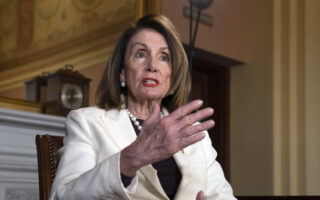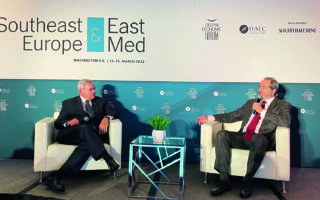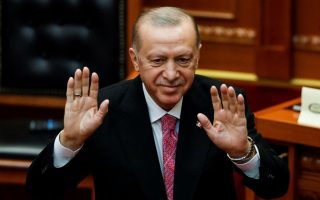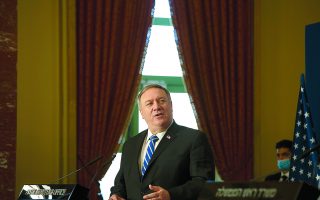Three scenarios for the war in Ukraine
Leon Panetta, former US secretary of defense and CIA director, speaks to Kathimerini about Putin’s mistakes, China’s role, and how to deal with Turkey
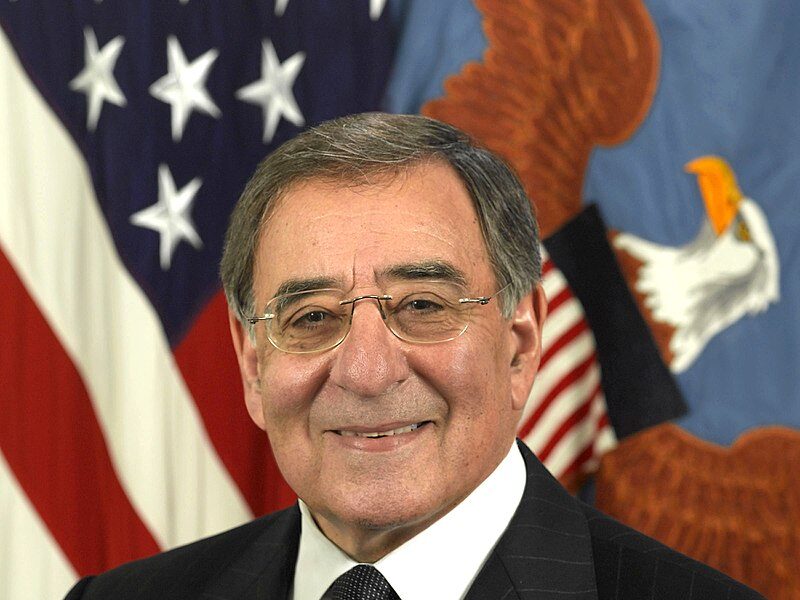
When, in February 2013, it was time to end his nearly 50-year political career, Leon Panetta, with then-President Barack Obama by his side, had remembered Harry Truman’s advice: If you want a friend in Washington, get a dog. Panetta took the advice. He got a dog, Bravo, who followed him through the critical posts of his late career, first at the CIA directory, then at the Pentagon. Bravo never betrayed the big secrets – like the operation to eliminate Osama bin Laden, of which Panetta was the mastermind.
Today, the former CIA director (2009-11) and former secretary of defense (2011-13), who served as White House chief of staff under Bill Clinton from 1994-97, talks to Kathimerini about Putin’s mistakes in Ukraine, the threats of China and Iran, and Turkey’s relationship with Greece.
As a politician with strong influence and deep knowledge of political science, what is your assessment of Vladimir Putin’s initial reason for invading Ukraine?
Well, it was not a surprise to me, having been director of the Central Intelligence Agency and former secretary of defense, because I knew that Putin was someone who had a sense of weakness on the part of the United States and our allies and because he is a bully took advantage of it and that is why he invaded Crimea, invaded Syria, invaded Libya, and conducted a very bold cyberattack against our election institutions in the United States and never had to pay a price.
So when he threatened to go into Ukraine, even though for the first time the United States and our allies made clear that he would pay a heavy price, he continued to assume weakness and therefore decided he would take advantage of it again and made, probably, one of the worst strategic mistakes in his lifetime in terms of deciding to invade Ukraine.
How did the intelligence agencies misinterpret Putin’s moves and intentions?
‘What path we take in many ways is going to be very dependent on Putin and whether or not he ultimately accepts the fact that he is not going to achieve his primary goal’
The intelligence agencies had developed pretty good intelligence with regard to the Russian moves and had made the decision that Putin would invade Ukraine, but they believed that it was important to reveal that information publicly so that even though Putin was saying he would not invade or he had not made up his mind, the agencies made clear that he was lying and that the Russians were preparing for a massive invasion of Ukraine. I think providing that information to the world in many ways further undermined the credibility of Putin and that was a good thing.
In the wake of another cold war era, how close are we to a total war? Are the Western societies prepared to engage in a new war, or to deal with its repercussions?
I have described the Ukrainian case as both dangerous and pivotal. It is dangerous because it does have the possibility of escalating into a broader war. There is no question about that. And obviously dangerous because of the amount of destruction and the number of lives that have been lost. But it is very pivotal.
At this point in the 21st century, what happens in Ukraine will tell us a great deal about what happens with democracies in the 21st century. If a sovereign democracy like Ukraine can stand up and prevent Russia from having its way and can push them back and be able to protect their sovereign democracy, and have the United States and our NATO allies unified behind them, not only implementing sanctions against Russia but providing military weapons and also reinforcing NATO is a very important message to send not just to Russia, but to China, to North Korea, and Iran, to make very clear that if democracies can come together and unify, they could represent a force against autocrats in the future.
What possible de-escalation actions could be taken and what is diplomacy’s role?
That is obviously the challenge that everybody is thinking long and hard about right now. I think we have gone through three stages in this war. One was the failed invasion by Russia. Russia had planned to go in within a few days, capture the capital and bring down the government in Ukraine, and that failed. The second stage was what I call siege warfare and not only the destruction of cities and towns, but the killing of innocent men, women and children in an effort to, I think, break the will of the Ukrainian people, and that did not work either.
Now we are in the third stage, which is in many ways a prolonged war of attrition. Russia has retreated from Kyiv and now is focused on the Donbas area, trying to be able to expand its influence there. Ukrainians are fighting back. And so we are clearly in a war of attrition which can go several ways.
Number one, it could go on for a long time, not just months, but perhaps years, where there is this constant back and forth because the Ukrainians are strong in their way and the Russians, even though they are making some success, have been depleted a great deal in terms of their strength. So this could go on.
The second possibility is negotiations in which Putin finally realizes that he is going to get as much as he can get, but that he cannot sustain the kind of losses that he is sustaining. Right now, the projection is that they have lost anywhere from 10,000 to 15,000 soldiers. So he might agree at that point to at least sit down and try to negotiate a ceasefire of some kind. That depends on Putin, and right now, it does not appear very likely.
The third possibility is that this could escalate, that both sides could become frustrated or take steps to go after the other side. The Ukrainians could go after Russian artillery sites, missile sites, even in Russia, and escalate the war with Putin. Putin could decide that it is time to use chemical and gas warfare or a battlefield nuclear weapon. He has threatened to do that. If that happens, then there is no question that this war could escalate into something much larger. What path we take in many ways is going to be very dependent on Putin and whether or not he ultimately accepts the fact that he is not going to achieve his primary goal and that it would be wiser for him to basically resolve this so that he could survive in office, which I think is still a question mark.
You mentioned that Erdogan is sometimes unpredictable. Putin’s aggressiveness provided fertile ground for President Erdogan’s provocations against Greece. Do you foresee a military escalation between Turkey and Greece? And if so, will the US adopt an equal distance policy?
I think we are living in the 21st century and I think it is time that Turkey accepts the existence of Greece as a country that is sovereign and independent on its own. And I know that that competition is a historical one that goes back a long way but the reality is that Greece is a strong ally, that Greece is its own country, maintains its own independence, and therefore that sovereignty and that independence should be protected.
I know Erdogan will oftentimes speak aggressively about the relationship, although right now his biggest concern is the Kurds and what the Kurds are doing. I suspect that because we are now in the 21st century and because democracies should be recognized as sovereign democracies that have the right to govern as they want to govern. My hope is that ultimately countries can come together and unify not against one another, but unify together against common enemies like Russia.
Based on the geopolitical changes and China’s behavior. What is your prediction for the future, and how should NATO’s future moves be formed?
We do live in a dangerous world, let’s face it. It is not just the war between Ukraine and Russia. It is also China and their aggressive attitude that somehow they will replace the United States, that they will dominate the world in their own way.
We are concerned about North Korea and its ability to develop nuclear weapons and be able to deploy those weapons using intercontinental ballistic missiles. We are concerned about Iran and the possibility that they, too, could develop a nuclear weapon and be able to deploy that weapon and create further instability in that region.
We are dealing with terrorism, Al Qaida, ISIS, other terrorist groups that continue to target Western countries. We are dealing with cyber, which has become a new battlefield in the future in terms of cyberattacks. So we are dealing with a dangerous and unpredictable world. It is very important, it seems to me, for the United States to develop and strengthen our alliances throughout the world in order to confront those kinds of challenges. We have been able to do that with the United States and NATO’s confronting Russia. That’s an important message to send to Russia. We need to send the same message to China, which is that the United States will work with our allies in the Pacific, the Asian countries, Japan, South Korea, Australia, India and others. And that we will send some clear messages to China that there are lines they should not cross. And hopefully, allow that to open up an opportunity for dialogue.
I think President Xi Jinping has been badly hurt. Having supported Russia and then seeing what happened with the failed Russian invasion. I think President Xi is being very careful now about what steps China will take. So it is very important, it seems to me, that democracies have to learn to work together in a unified way to protect our security not only in Europe but in Asia, the Middle East, and elsewhere.
